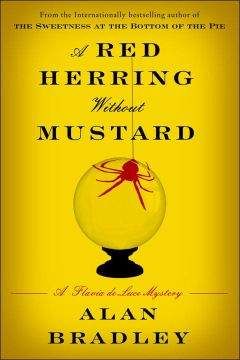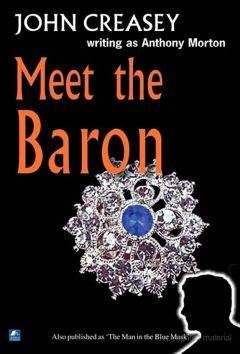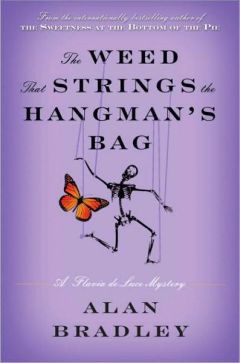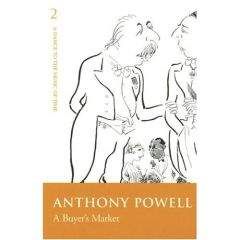Alan Bradley - The Weed That Strings the Hangmans Bag
На сайте mybooks.club вы можете бесплатно читать книги онлайн без регистрации, включая Alan Bradley - The Weed That Strings the Hangmans Bag. Жанр: Прочее издательство неизвестно,. Доступна полная версия книги с кратким содержанием для предварительного ознакомления, аннотацией (предисловием), рецензиями от других читателей и их экспертным мнением.
Кроме того, на сайте mybooks.club вы найдете множество новинок, которые стоит прочитать.
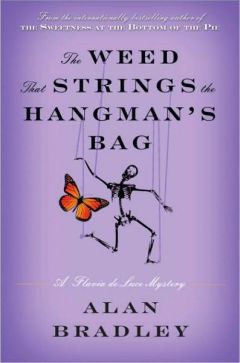
Alan Bradley - The Weed That Strings the Hangmans Bag краткое содержание
The Weed That Strings the Hangmans Bag читать онлайн бесплатно
"You go on ahead," I said. "I'll come down to the field in a few minutes."
I swept Tock up into my arms. "Who's a pretty pussy, then?" I cooed, watching from the corner of my eye to see if anyone was taken in. I knew that the cat was not: She had begun to squirm immediately.
But Rupert and Nialla were already piling into the van, which still stood shuddering away to itself in the yard. Dieter gave a shove and climbed onto the running board, and a moment later, with a wave, they were bumping out of the yard and into the lane that led down the slope to Jubilee Field and the river. A gentle backfire in the middle distance confirmed their departure.
The moment they were out of sight, I put Tock down in the dusty yard.
"Where's Tick?" I said. "Go find her."
Tock resumed her long feline monologue, and stalked off to the dovecote.
Needless to say, I followed.
* SEVEN *
THE DOVECOTE WAS A work of art. There's no other way of putting it, and I shouldn't have been in the least surprised to hear that the National Trust had its eye on it.
It was from this remarkable specimen of architecture that Culverhouse Farm had taken its name--"culverhouse" being the old word for a dovecote. This one was a tall round tower of ancient bricks, each one the shade of a faded rose, but no two of them alike. Built in the time of Queen Anne, it had once been used to breed and raise doves for the farm's dinner table. In those days, the legs of the little dovelets were snapped to keep them fattening in the nest (this fact gleaned from the kitchen chatter of Mrs. Mullet). But times had changed. Gordon Ingleby was an avid pigeon fancier, and the birds that had lived in the tower in this century were more likely to be coddled by hand than in boiling water. At the weekends, he had sent them off by rail to some far-flung flyspeck on the map of England, where they would be released to come flapping immediately back to Culverhouse Farm. Here, they would be welcomed by the slapping-off of elaborate mechanical time clocks, much petting and bragging, and a great gorging on grain by the birds.
At least, such had been the case until little Robin Ingleby had been found hanging by the neck from the rotted gallows in Gibbet Wood. Since that day, other than a few wild specimens, there had been no more doves at Culverhouse Farm.
Poor Robin, when he died, had been the same age as I was then, and I found it hard to believe that someone so young could actually be dead. Still, it was a fact.
When one lives in a village, the more things are hushed up, the more one hears, and I remembered the undercurrent of gossip that had swept through Bishop's Lacey at the time, lapping away like the tide at the timbers beneath a pier.
"They say young Robin Ingleby's gone and killed himself." "Robin Ingleby's been done in by his parents." "The little lad's been slaughtered by Satanists. Mark my words--"
Most of these theories had been leaked to me by Mrs. Mullet, and I thought of them now as I approached the tower, gazing up in wonder at its myriad of openings.
As that monk called the lector had done in the monasteries of the Middle Ages, Daffy often read aloud to us as we ate our meals. We had recently been treated to Henry Savage Landor's description, in Across Coveted Lands, of the Towers of Silence, in Persia, on top of which the Parsees placed corpses in a sitting position, with a stick under the chin to keep them upright. When the crows arrived to squabble over the body, it was considered a ticket to Heaven if the right eyeball was the first one consumed. The left was not quite so auspicious.
I could not help thinking of this now, and of the author's account of the curious circular pigeon towers of Persia, each with a deep central pit for the collection of guano, whose production was the sole reason for keeping the birds.
Could there be, I wondered, some strange connection between towers, birds, death, and corruption? As I paused there for a moment, trying to think what it might be, a peculiar sound came drifting from the tower.
At first I thought it might be the muttering and cooing away to themselves of doves, high above my head in the cote. Or was it the wind?
It seemed too sustained to be either of these, rising and falling like the sound of a ghostly air-raid siren, almost at the threshold of hearing.
The sagging wooden door stood ajar, and I found that I could slip through easily into the hollow center of the tower. Tock brushed past my ankles, then vanished into the shadows in search of mice.
The sharp reek of the place slapped me in the face: the unmistakable chemical smell of dove's guano, which the great Humphry Davy had found to yield, by distillation, carbonate of ammonia, with a residuum of carbonate of lime and common salt, a finding I had once verified by experiment in my chemical laboratory at Buckshaw.
Far above my head, countless beams of sunshine slanting in through the open ports dappled the curving walls with dots of yellow light. It was as if I had stepped into the colander in which some giant strained his soup bones.
Here, inside, the wailing sound was even louder, a whirlpool of noise amplified by the circular walls, of which I was the very center. I couldn't have called out--even if I'd dared.
At the center of the room, pivoting on an ancient wooden post, was a moveable scaffold, somewhat like a library ladder, which must at one time have been used by their keepers to gain access to the doomed little birds.
The thing groaned fearsomely as I stepped onto it.
Up I went, inch by inch, hanging on for dear life, stretching my arms and legs to make impossible giant steps from one creaking crosspiece to the next. I looked down only once, and it made my head swim.
The higher I climbed, the louder the keening sound became, its echoes now coming together in a chorus of voices that seemed to congregate in some wild, high lament.
Above me, and to my left, was a vaulted opening that gave onto a niche larger than the others. By standing on tiptoe and seizing the brick ledge with my fingertips, I was able to pull myself up until my eyes were level with the floor of this grotto.
Inside, a woman knelt, her back towards me. She was singing. Her thin voice echoed from the bricks and swirled round my head:"The robin's gone afloat
The wind that rocks him to and fro
With a soft cradle-song and slow
Pleases him in the ebb and flow,
Rocking him in a boat."
It was Mrs. Ingleby!
In front of her, on an overturned box, a candle burned, adding its smoky odor to the stifling heat of the little brick cave. To her right was propped up a black-and-white photograph of a child: her dead son, Robin, who grinned happily at the camera, his shock of blond hair bleached nearly white by the sun of long-gone summer days. To her left, lying on its side, as if it were hauled up on the beach to be cleaned of barnacles, was a toy sailboat.
I held my breath. She mustn't know I was here. I would climb down slowly, and--
My legs began to shake. I hadn't much of a grip, and my leather soles were already slipping on the weathered wooden frame. As I started to slide back, Mrs. Ingleby began her wail again, this time another song and, oddly, in another voice: a harsh, swashbuckling, piratical gargle:"So, though bold Robin's gone,
Yet his heart lives on,
And we drink to him with three times three."
And she let out a horrible, snuffling laugh. I pulled myself up on tiptoe again, just in time to see her twist the cork from a tall clear bottle, and take a quick, bobbing swig. It looked to me like gin, and it was plain to see that she had been at it for some time.
With a long, shuddering sigh, she pushed the bottle back under a pile of straw and lit a new candle from the dwindling flame of the one that was dying. With drips of flowing wax, she stuck it in place beside its exhausted fellow.
And now she began another song, this one in a darker minor key; sung more slowly, and more like a dirge, pronouncing every word with an awful, exaggerated clarity:"Robin-Bad-fellow, wanting such a supper,
Shall have his breakfast with a rope and butter
To which let all his fellows be invited
That with such deeds of darkness are delighted."
Rope and butter? Deeds of darkness?
I suddenly realized that my hair was standing completely on end, the way it did when Feely stroked her black ebonite comb on her cashmere sweater and brought it close to the nape of my neck. But while I was still trying to calculate how quickly I could scramble back down the wooden frame and make a run for it, the woman spoke: "Come up, Flavia," she said. "Come up and join in my little requiem."
Requiem? I thought. Do I really want to scramble up into a brick cell with a woman who is at best more than a little inebriated, and at worst a homicidal maniac?
I hauled myself up into the gloom.
As my eyes became accustomed to the candlelight, I saw that she wore a white cotton blouse with short puffed sleeves and a low peasant-girl neckline. With her raven black hair and her brightly colored dirndl skirt, she might easily be taken for a gypsy fortune-teller.
"Robin's gone," she said.
Those two words nearly broke my heart. Like everyone else in Bishop's Lacey, I had always thought that Grace Ingleby lived in her own private, insulated world: a world where Robin still played in the dusty dooryard, chasing flustered hens from fence to fence, dashing into the kitchen now and then to beg a sweet.
But it was not true: She had stood as I had done, beside the small gravestone in the churchyard of St. Tancred's, and read its simple inscription: Robin Tennyson Ingleby, 1939-1945, Asleep in the Lamb.
"Robin's gone," she said again, and now it was almost a moan.
"Yes," I said, "I know."
Motes of dust floated like little worlds in the pencil beams of sunlight that penetrated the chamber's gloom. I sat down in the straw.
As I did so, a pigeon clattered up from its nest, and out through the little arched window. My heart almost stopped. I had thought the pigeons long gone, and I almost sat on the stupid thing.
"I took him to the seaside," Grace went on, caressing the sailboat, oblivious to the bird. "Robin loved the seaside, you know."
I pulled my knees up under my chin and wrapped my arms around them.
"He played in the sand. Built a sand castle."
There was a long silence, and I saw that she had drifted off somewhere.
"Did you have ice cream?" I asked, as if it were the most important question in the world. I couldn't think of anything else.
"Ice cream?" She nodded her head. "They gave it to us in paper cups ... little pointed paper cups. We wanted vanilla--we both loved vanilla, Robin and I. Funny thing, though ..." She sighed. "When we ate it, there was a taste of chocolate ... as if they hadn't rinsed the scoop properly."
I nodded wisely.
"That sometimes happens," I said.
She reached out and touched the sailboat again, running her fingertips over its smooth painted hull. And then she blew out the candle.
We sat for a while in silence among the spatterings of sunshine that seeped into the red brick cave. This must be what the womb is like, I thought.
Hot. Waiting for something to happen.
"Why are you here?" she said at last. I noticed that she was not slurring her words as much as before.
"The vicar sent some people to camp in Jubilee Field. He asked me to show them the way." She seized my arm.
"Does Gordon know?" she demanded.
"I think he does," I said. "He told the vicar it would be all right if they camped at the bottom of the lane."
"The bottom of the lane ..." She let out a long, slow breath. "Yes, that would be all right, wouldn't it?"
"It's a traveling puppet show," I said. "Porson's Puppets. They're putting on a performance Saturday. The vicar's asked them. Their van's broken down, you see, and ..."
I was gripped by a sudden inspiration.
"Why don't you come?" I asked. "Everyone in the village will be there. You could sit with me, and--"
Mrs. Ingleby was staring at me with horror.
"No!" she said. "No! I couldn't do that."
"Perhaps you and Mr. Ingleby could both come, and--"
"No!"
She scrambled to her feet, raising a thick cloud of chaff, and for a few moments, as the stuff swirled round us, we stood perfectly still, like figures in a snow-globe paperweight.
"You'd better go," she said suddenly, in a throaty voice. "Please go now."
Without a word I groped my way to the opening, my eyes streaming from the dust. With surprisingly little effort, I found myself able to drop down onto the wooden vane, and begin the long climb down.
I have to admit that Jack and the Beanstalk crossed my mind.
The farmyard was deserted. Dieter had gone down the lane with Rupert and Nialla to the river, and by now they had probably already made camp. If I was lucky, I might be just in time for a cup of tea. I felt as if I'd been up all night.
What was the time, anyway?
God blind me with a fish fork! Aunt Felicity's train was due to arrive at five past ten and I'd completely forgotten about her! Father would have my guts for garters.
Even if Aunt Felicity wasn't already fuming on the platform and frothing at the mouth, how on earth was I ever going to get to Doddingsley? It was a good six miles from Culverhouse Farm, even as the crow flies, and as far as I knew, I wasn't about to sprout wings.
Down the lane I ran, windmilling my arms as if that could propel me to a greater speed. Fortunately, it was downhill all the way, and at the bottom, I could see Rupert's van parked beneath the willows.
Dieter had the Austin's hood open and was poking around in its innards. Nialla was hanging a shirt on the bushes to dry. Gordon Ingleby was nowhere in sight, nor was Sally Straw.
"First chance I've had to break out the old Sunlight," Nialla told me. "Dieter's having a peek at the motor. Whatever took you so long?"
"What time is it?" I pleaded.
"Search me," she replied. "Rupert's the only one who owns a watch, and he's taken himself off somewhere."
As he always does. She did not actually speak the words, but her meaning was as clear as if she'd shouted them from the top of Big Ben.
"Dieter?" I asked.
Dieter shook his head. "Sorry. It was for such a long time forbidden to possess one...."
"Excuse me," I interrupted, "but I have to meet a train."
Before they could answer, I was off along the towpath at top speed. It was an easy run along the old embankment, which skirted the southern edge of Jubilee Field, and within surprisingly few minutes, I was leaping across the stepping-stones to the churchyard.
The clock on the church tower showed twenty minutes to four, which was impossible: The stupid thing had probably stopped in the reign of Henry the Eighth and nobody had cared enough to set it going again.
Похожие книги на "The Weed That Strings the Hangmans Bag", Alan Bradley
Alan Bradley читать все книги автора по порядку
Alan Bradley - все книги автора в одном месте читать по порядку полные версии на сайте онлайн библиотеки mybooks.club.
